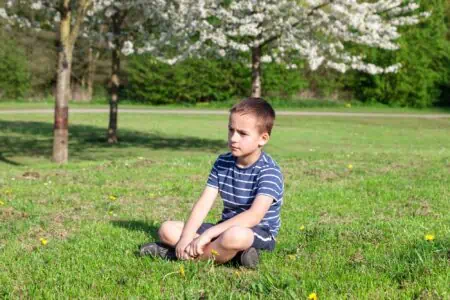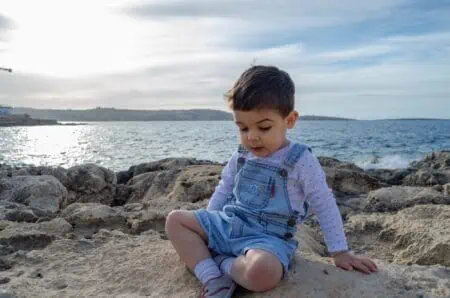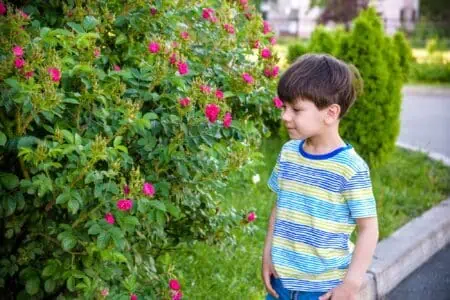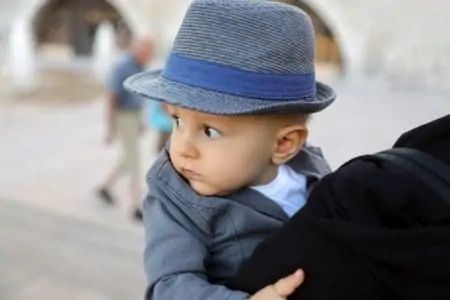If you’re looking for a captivating, “jaw-dropping” name, then these strong Russian boy names are sure to do the job!
Many Russian male names are some of the most powerful, inspiring, and fascinating names around. So whether you’re hoping to find something very unique, unusual, or trendy, or perhaps a name with a little bit of badass, we’ve got you covered.
So before we get too carried away, let’s dive in, shall we?
100 Cool Russian Names for Boys
These Russian boy names offer an unmatched charm and deep, insightful meaning.
Abataly
Abataly is considered very rare among old Russian boy names. So if you’re looking for something very unique, Abataly could be a keeper! The exact meaning is unknown, however, some sources suggest it comes from the Greek word for “temple or sanctuary.”
- Origin: Russian, Greek
- Meaning: Sanctuary, temple
- Pronunciation: ah-bat-al-yee
Akim
Akim is the Russian version of the traditional Hebrew name Yehoyakim or Joachim. It is also derived from the Arabic word “hakim” meaning “ruler or governor.” A lovely name for parents who hope to see a sincere, strong heart in the life of their new son.
- Origin: Russian, Hebrew
- Meaning: Jehovah raises up, Yahweh establishes
- Pronunciation: uh-keem
- Variations: Yakim
- Namesakes: Akim Tamiroff, a Russian American actor who acted in over 80 motion pictures, is best known for his supporting roles in The General Died at Dawn and For Whom the Bell Tolls.
Albert
Albert is a gorgeous old male name, sure to take over the limelight yet again. It is derived from the Old Germanic names Adalbert and Adelbert. If broken down, it consists of the German words “adal,” meaning “noble,” and “beraht,” meaning “bright.” Many stunning versions have evolved across many languages.
- Origin: Russian, Old German
- Meaning: Noble, bright, famous
- Variations: Elbert, Adbert, Alberto
- Namesakes: Saint Albert the Great, a German Catholic philosopher, scientist, and bishop. Albert Brooks, an American actor, comedian, and filmmaker.
- Popularity: Albert was most popular in the USA in 1910. It is now less popular while remaining in the top 1000.
Aleksei
Aleksei is a charming Russian version of the Greek name Alexios, a derivative of Alexander. You will come across this name in many countries, so it could easily make an excellent name choice for the more multicultural family. Depending on your preference, you can also choose between a wide array of gorgeous variations.
- Origin: Russian
- Meaning: Defender, Badass
- Pronunciation: ah-lek-SYEY
- Variations: Alexey, Alexei, Alexie, Aleksey
- Namesakes: Aleksei Yevgenyevich Kravchenko, a Russian actor, is best known for his role in the 1985 film “Come and See” as a young boy in the army.
- Popularity: Aleksei is pretty popular in Russian but less popular in the USA.
Alexander
Aleksander is the most popular among Russian boy names (1). It is derived from the Greek word Alexandros, a term used to describe “battle-prowess,” or the ability to withstand and push back enemy lines during battle. It offers a range of gorgeous variations, while the common Russian diminutive is Shasha or Sashenka. Inspired by the mighty conqueror and King, Alexander the Great, it’s no wonder this name remains a beloved favorite.
- Origin: Russian
- Meaning: Defender of man, protector of man
- Pronunciation: al-eg-ZAN-der
- Variations: Alexandria, Alexsander, Alexsandr, Alex, Alexandre, Alessandro
- Namesakes: Alexander Ponomarenko, a Russian billionaire and businessman. Aleksandr Ptushko, considered the Soviet “Walt Disney.”
- Popularity: In the USA, Alexander has remained in the top 100 since 1977. It ranked a high of #10 in 2020.
Amvrosy
Amvrosy is a strong Christina male name, derived from the Greek word “ambrosios,” meaning “immortal.” The famous Saint Ambrose of Optina is known for popularizing the name throughout the Russian Orthodox Church.
- Origin: Russian
- Meaning: Immortal, god-like
- Pronunciation: ahm-vroy-see
- Variations: Ambrose, Avrosim, Abrosim, Ambros
- Popularity: Amvrosy is rare among Russian names for boys.
Andrei
Andrei could be a stunning name to capture the new little man you’re about to welcome into the world. Andrei is a Slavic and Romanian name, also commonly used in Russian families. It is derived from the Greek word “andros” or “aner” meaning “man” and has been adapted into many versions across many languages.
- Origin: Russian, Greek, Slavic
- Meaning: Manly, Warrior
- Pronunciation: ahn-DRAY
- Variations: Andrey, Andrej, Andreas, Ander, Andres
- Namesakes: Andrei Karlov, a Russian diplomat.
- Popularity: Andrei is common in Russian families, while its alternative version Andre is considered popular in the USA.
Andrik
Andrik comes from the Russian variation of the Latin name Adrian, inspired by an Italian town called Hadria. Other sources suggest it is a combination of the Greek words “ander” meaning “man” and “ríkr” meaning “mighty, distinguished, and rich.”
- Origin: Russian, Latin
- Meaning: Rich man
- Pronunciation: AN-drik
- Variations: Adrien, Adrion, Adrian
- Popularity: Andrik is a pretty rare name among Russian males.
Avros
Avros is an old Russian name believed to originate from the Latin word for “golden.” This stunning name could be a fantastic way to capture the precious treasure about to enter your world.
- Origin: Russian, Latin
- Meaning: Rich in gold, golden
- Popularity: Avros is considered very rare among Russian male names.
Benedikt
Benedikt is the Russian version of the Latin name Benedict, inspired by the famous Saint Benedict of Nursia, a patron saint of Europe. He was an Italian monk known for founding the Benedictines in the 6th century. This charming name can be heard throughout Europe and could easily be shortened to Ben or Benny.
- Origin: Russian, Latin
- Meaning: Blessed
- Pronunciation: BEH-neh-dikt
- Variations: Bennett, Bendt, Benedictus
- Namesakes: Benedikt Magnússon, an Icelandic strongman and powerlifter who holds the raw deadlift world record. Benedikt Höwedes, a German professional footballer.
Bogdan
Bogdan consists of two Slavic elements, namely “bogu” meaning “god,” and “dan” meaning “given.” Indeed, a delightful name to capture the unique gift of life reflected in your new boy.
- Origin: Russian, Slavic
- Meaning: Given by God
- Pronunciation: BAWG-dahn
- Variations: Bohdan, Boban, Bogdana
- Namesakes: Bogdan Ilić, or Baka Prase, a Serbian YouTuber, internet personality, rapper, actor, and entertainer. Bogdan Filov, a Bulgarian archeologist, historian and politician.
- Popularity: Bogdan is a pretty common male name throughout Eastern Europe and Russia.
Boris
Boris could be a strong masculine name for your beloved son. It is a shortened version of Borislav, derived from the Slavic term “boru” meaning “battle or fight.” Other sources suggest it originally comes from Bulgar, an extinct Oghur Turkish language.
- Origin: Russian, Slavic
- Meaning: Battle, fight
- Pronunciation: BAWR-is
- Variations: Borys, Barys
- Namesakes: Boris and Gleb, were Russian 11th-century princes and the first recognized Russian saints. Boris Berezovsky, the first Russian billionaire.
- Popularity: Boris was most popular in the USA in 1962 and has since disappeared off the popularity charts. It is more commonly used in Russia.
Borya
Borya is the delightful diminutive form and alternative to Boris. So if you’re looking for something a little different and intriguing, Borya could be a stunning choice for the shortlist.
- Origin: Russian, Slavic
- Meaning: Fighter
- Pronunciation: BAWR-yah
- Popularity: Borya is rare among Russian boy names.
Bronislav
Czechs, Russians, and Slovaks typically use Bronislav. It is a variation of the name Bronisław, which consists of two Slavic elements- “borna” meaning “protection,” and “slava” meaning “glory.” Bronislav could be a perfect name for your very own little hero.
- Origin: Russian, Slavic
- Meaning: Glorious protector
- Style: Classic, Hero
- Pronunciation: braw-NYEE-swaf
- Variations: Bronislaw, Branislovas, Bronius, Branko
- Namesakes: Bronislav Gimpel, a Polish-American violinist and teacher known for recording music for motion pictures.
Chernobog
Chernobog is the Russian version of the Slavic boy name Crnbog. It consists of two Slavic words- “cherno,” meaning “black,” and “bog,” meaning “god.” In Slavic mythology, Chernobog is considered the god of evil and darkness, while Belobog is referred to as the “white god.”
- Origin: Russian, Slavic
- Meaning: Black god
- Style: Unusual, Badass
- Pronunciation: cher-NO-bog
- Variations: Zherneboh, Czernobog
- Popularity: Chernobog is a rare name among Russian boys.
Daniil
Daniil is the charming Russian version of the Greek and Hebrew Daniel- a stunning name that has remained in the top 20 names in the USA since 1952. Daniel originates from the Book of Daniel in the Old Testament. He was known for interpreting dreams and visions of the King of Babylon and for surviving an evening in a lion’s den!
- Origin: Russian, Greek
- Meaning: God is my judge
- Pronunciation: dah-nee-EL
- Variations: Danil, Daniel, Dani, Danny
- Namesakes: Daniil Simkin, a Russian principal ballet dancer with the American Ballet Theatre and Berlin State Ballet. Daniil Gleikhengauz, a Russian professional ice dancer and single skater.
- Popularity: Daniil is pretty popular among Russian male names.
Demyan
Demyan is the unique Russian version of the Latin name Damian or Damien, which ultimately comes from Damianus or Damianos. In Greek, the name originates from the word “daman” meaning “to tame” or “to kill.” While daring and confident, Demyan could also be a perfect badass name.
- Origin: Russian, Latin
- Meaning: To tame, to subdue
- Pronunciation: dyem-YAHN
- Variations: Damian, Damien
- Namesakes: Demyan Bedny, a Russian Soviet poet, Bolshevik, and satirist.
Desya
Desya is the traditional nickname for modest, which ultimately comes from the Latin name modestus. A charming boy’s name, reflecting some qualities you may hope to see in your beloved son one day.
- Origin: Russian
- Meaning: Moderate, sober
- Pronunciation: des-YAH
- Popularity: Desya is not common among Russian names for boys.
Dmitry
Dmitry is the Russian variation of the Greek name Demetrios or Demetrius. In ancient Greece, the name Dmitsy also meant “follower of Demeter,” the Olympian goddess of the harvest and agriculture. Dmitry is a fairly common male name throughout Orthodox Christian culture and is often shortened to Dima or Mitya. You may come across many variations of Dmitry across a wide range of languages.
- Origin: Russian
- Meaning: Loves the earth, devoted to, dedicated to
- Pronunciation: deh-MEE-treey
- Variations: Dmitri, Dmitriy, Dimitri, Dimitry, Demetri
- Namesakes: Dmitry Andreikin, a Russian chess grandmaster, world champion, and two-time Russian Chess Champion. Dmitry Pumpyansky, a Russian billionaire and businessman and owner of OAO TMK. Dmitry Kroyter, a Siberian, Israeli Olympic high jumper.
- Popularity: Dmitry is common among Russian boy names, while very rare in the USA.
Dobrushin
Dobrushin is a very rare Russian and Slavic name, so if you’re looking for a ‘one-in-a-million name,’ this could be a keeper! It is derived from the Slavic word “dobro” meaning “good.” You will also hear Dobrushin used as a surname. Roland Dobrushin was a Russian mathematician who made significant contributions to probability theory, mathematical physics, and information theory.
- Origin: Russian, Slavic
- Meaning: Goodness
- Pronunciation: doh-bra-shin
- Variations: Dobrashin
Eduard
Eduard is the Czech, German and Russian version of the Old English name Edward. A delightful name offering loads of traditional charm and many different spellings in other languages. This includes Edvard in Finnish and Norwegian, Eideard in Scottish, and Edoardo in Italian. Its sweet nickname, Teddy, may also make this name too gorgeous to resist!
- Origin: Russian, German, Czech
- Meaning: Wealthy guard
- Pronunciation: EH-doo-ahrd
- Variations: Edvard, Eadweard, Edoardo, Edorta
- Namesakes: Eduard Khil, a famous Russian Soviet baritone singer, who was known globally as Mr. Trololo, through his Youtube song “I am very glad, as I’m finally returning back home.” Eduard Limonov, a Russian writer, poet, publicist and politician.
- Popularity: Eduard is less common today, while it used to be more prevalent in the past.
Efrosin
If you’re looking for a unique name, then Efrosin could be a fantastic option. It is derived from the Old Greek name Euphrosynê, which means “mirth or merriment.” In Greek mythology, Euphrosynê was one of the Charities, also known as The Three Graces. Along with her two sisters, Euphrosynê was the daughter of Zeus, while their mother was a nymph.
- Origin: Russian
- Meaning: Joy, mirth
- Pronunciation: ef-roh-sin
- Variations: Effrosyni, Frosina
Elisei
Elisei is the delightful Russian version of the Biblical Hebrew name Elisha. The traditional Hebrew version is Elishu’a, which can also mean “God is gracious.” In the Old Testament, Elisha was a prophet and miracle worker who succeeded the famous prophet, Elijah.
- Origin: Russian
- Meaning: My God is salvation, God is my help
- Pronunciation: eh-lee-seh
- Variations: Elisey, Elisha, Yelisey, Eliseus, Elyesa, Alyasa
- Popularity: Elisei is a rare name among Russian male names.
Ermolai
Ermolai is the gorgeous variation of Yermolai, which comes from the Greek name Hermolaos or Hermes. Herma means “cairn, a pile of stones or boundary marker.” He was the Greek god of speech and good luck, known for serving Zeus as a messenger.
- Origin: Russian
- Meaning: Heap of stones
- Pronunciation: YEHR-maw-lie
- Variations: Ermolay, Yermolay, Yermolai
- Popularity: Ermolai is considered very rare among Russian boy names.
Evgeny
Evgeny is the Russian form of the Greek name Eugene, with “eu” meaning “well,” and “genos” meaning “race, stock or kin.” Eugene has been adapted into a wide array of variations across different languages, so there’s no shortage of beautiful choices- such as Euken in Basque, Eugeni in Catalan, Eugenio in Italian and Spanish, and Eugen in Slovak and Romanian.
- Origin: Russian, Greek
- Meaning: Well-born, of noble descent
- Pronunciation: yev-GYE-nee
- Variations: Evgeniy, Evgeni, Eugeny, Levgeny, Jevgeni, Yevgeni, Jewgeni
- Namesakes: Evgeny Kuznetsov, a Russian professional ice hockey player. Evgeny Korolev, a retired Russian professional tennis player and cousin of Anna Kournikova.
- Popularity: Evgeny has remained a pretty popular name throughout Russia and Eastern Europe.
Feofan
Feofan comes from the Greek name Theophanes, where “theos” means “god” and “phanes” means “appearing.” Feofan could undoubtedly be a perfect choice for parents who value deep devotion to God.
- Origin: Russian
- Meaning: Manifestation of God
- Pronunciation: fee-oh-fan
- Variations: Theophan
- Namesakes: Feofan Prokopovich, a Russian Ukrainian imperial Orthodox theologian, writer, poet, mathematician, and philosopher.
- Popularity: Feofan is pretty uncommon among Russian boy names.
Filat
Filat is the shortened version of the Russian name Feofilakt, which originates from the ancient Greek name Theophylaktos. If broken down, “theos” means “god,” while “phylakteos” means “to be watched.” Filat could make a solid first name, while it is also sometimes heard as a surname.
- Origin: Russian
- Meaning: God-guard
- Pronunciation: fee-lat
- Popularity: Filat is considered rare among Russian male names.
Florentiy
Florentiy comes from the Latin name Florentius, which originates from the word “florens,” meaning ‘“to blossom” or to “prosper and flourish.” If you’re hoping to find a very unique Russian name, then Florentiy is quite the keeper. You could also use Flo as the trendy nickname.
- Origin: Russian, Latin
- Meaning: Blossoming
- Pronunciation: flo-ren-tee
- Variations: Florentia, Florence
Fyodor
Fyodor is the Russian form of the Greek name Theodore or Theodorus, with “theos” meaning “god,” and “doron” meaning “gift.” A stunning way to portray the little treasure about to come your way.
- Origin: Russian
- Meaning: God’s gift
- Pronunciation: fee-oh-dor
- Variations: Fedor, Fedya, Feodor, Feodat
- Namesakes: Fyodor the Black, or Theodore Rostislavich, a saint of the Russian Orthodox Church and ruler of Smolensk and Yaroslavl. Fyodor I of Russia was the last Rurikid Tsar of Russia in the late 1500s.
Gavriil
Gavriil is the Russian form of the Hebrew boy’s name Gabriel, inspired by the famous archangel of God. This name also belonged to a great Russian navigator, who discovered the Bering Sea Islands of St. George Island and St. Paul Island in 1786 and 1787.
- Origin: Russian, Hebrew
- Meaning: Man of God, warrior of God
- Pronunciation: gah-vree-EEL
- Variations: Gavril, Gavriel,
- Namesakes: Gavriil Kachalin, a Soviet Russian professional football player and coach. Gavriil Baranovsky, a Russian architect, civil engineer, historian, and publisher from the late 1800s.
- Popularity: Gavriil is somewhat common in Russia and throughout Europe.
Gennadi
Gennadi is a stunning Russian variation of the Greek boy’s name Gennadios, derived from “gennadas” for “noble.” It originates from the Byzantine Empire, which reigned from 395 to 1453. If you’re looking for a timeless classic with an inspiring meaning, then Gennadi may be the one! The female version is Gennadiya.
- Origin: Russian
- Meaning: Noble
- Pronunciation: geh-NAH-deey
- Variations: Gennady, Gennadiy
- Namesakes: Gennadi Syomin, a Russian professional football coach and player.
Genrikh
Genrikh is the Russian version of the German boy’s name, Heinrich, a variation of Henry. It consists of two elements- “heim” meaning “home” and “ric” meaning “ruler.” A gorgeous name to show how your boy will always hopefully know his way home.
- Origin: Russian, German
- Meaning: Home ruler
- Pronunciation: gehn-reek
- Variations: Hendrick, Hendricus, Endika
- Namesakes: Genrikh Novozhilov, a Soviet Russian aircraft designer.
- Popularity: Genrikh is less common among Russian boy names.
Gerasim
Gerasim comes from the Greek name Gerasimos, commonly heard in Bulgaria and Macedonia. In Greek, “geras” means “honor or gift”- an excellent way to show the little gift of life in your new boy.
- Origin: Russian, Greek
- Meaning: Respectable, honorable elder
- Pronunciation: gee-reh-sim
- Namesakes: Gerasim Lebedev, a Russian adventurer, linguist, musician, writer, and pioneer of Bengali theatre from the late 1700s to early 1800s.
- Popularity: Gerasim is very rare among Russian male names.
Gleb
Gleb has its roots in the Old Norse name Guðleifr, where “guð” means “god” and “leifr” means “heir.” Gleb could make a delightful name for parents who value truth, honor, and faithfulness.
- Origin: Russian, Slavic
- Meaning: Heir of God
- Pronunciation: ghleb
- Namesakes: Gleb Strizhenov, a Soviet actor and Honoured Artist of the RSFSR in 1974. Gleb Savchenko, a Russian American dancer, choreographer, model, and professional dancer on Dancing with the Stars, USA.
Grigory
Grigory originates from the Greek word egrḗgoroi, which means “wakeful.” It could be a perfect name to encourage an alert and insightful nature in your young boy. A similar version belonged to the mysterious mystic, Grigori Rasputin. He was a Siberian-Russian, who befriended and gained significant influence over Tsar Nicholas II and his wife, Alexandra Feodorovna.
- Origin: Russian
- Meaning: Awake, watchful
- Pronunciation: gree-GO-reey
- Variations: Grigori, Grigoriy, Greger, Gregoire, Gregor
- Namesakes: Grigory Neujmin, a Georgian-Russian astronomer.
- Popularity: Grigory is pretty popular among Russian boy names.
Igor
Igor is the Russian and Slavic variant of the Old Norse name Ingvar, which originates from the Germanic god Yngvi-Freyr. A mighty, masculine name, it came from the ancient region of Kievan Rus’, whose inhabitants are considered the cultural ancestors of Belarus, Russia, and Ukraine. Some sources say Igor also means “protected.”
- Origin: Russian, East Slavic
- Meaning: Warrior
- Pronunciation: ee-gor
- Variations: Egor, Ingvar, Ingrid, Ingram
- Namesakes: Prince Igor Constantinovich, a Russian prince, who the Bolsheviks murdered in 1918. Igor Chugainov, a Russian football coach and former professional football player.
- Popularity: Igor is pretty popular among Russian boy names.
Ilya
Ilya is the delightful Russian version of the Greek name Elias, which comes from the Hebrew Eliyahu. Directly translated, it means “my God is Yahu or Jah,” which references God’s holy name, Yahweh. Ilya could be a perfect name for parents who want to raise a boy devoted to his God.
- Origin: Russian
- Meaning: The Lord is my God
- Pronunciation: eel-yah
- Variations: Illia, Iliya, Ilya, Ilyich
- Namesakes: Ilya, Archbishop of Novgorod, a 12th-century Russian saint. Ilya Ilyich Mechnikov, a Russian Imperial zoologist and Noble Prize winner, best known for his contributions to immunology.
- Popularity: Ilya is a reasonably common Russian name.
Immanuil
Immanuel is the delightful Russian variation of the classic Hebrew name Immanuel or Emmanuel. It consists of the root words “im” meaning “with” and “El ” which refers to God. A stunning name, holding a great sense of awe and wonder.
- Origin: Russian
- Meaning: God is with us
- Pronunciation: ee-man-oo-eel
- Variations: Immanuel, Emmanuel, Emanuel, Imanol, Manel
- Popularity: Immanuel is considered pretty rare among Russian names for boys.
Inna
While Inna is commonly used as a female name, it also features as a Russian male name. The exact meaning is unknown, but some sources suggest it means “strong water.” Inna was popularized through a male, early East Orthodox saint, believed to be a disciple of Saint Andrew. Its unique name-day in Russia is the 2nd of February.
- Origin: Russian
- Meaning: Strong water
- Pronunciation: EE-nah
- Variations: Ina
- Namesakes: Inna is a popular Romanian singer.
- Popularity: Inna is more prevalent among Russian girl names and less popular among boy names in Russia.
Iosif
Iosif is the stylish Russian version of the name Joseph, which ultimately comes from the Hebrew name Yosef, meaning “he will add.” This could be an excellent name to reflect your trust and hope in God.
- Origin: Russian, Hebrew
- Meaning: God will increase
- Pronunciation: YO-seef
- Variations: Osip, Yousef, Yusuf, Yusif, Jusuf
Isaak
Isaak is a stunning, more versatile name for parents wanting to use a name across different cultures and languages. It is the German and Russian version of the Hebrew name, Yitzchak. In the Hebrew Bible, Isaac is one of the three patriarchs and son of Abraham and father of Jacob.
- Origin: Russian, Hebrew
- Meaning: He will laugh
- Pronunciation: ee-sak
- Variations: Isaaq, Ishak, Isak, Izak, Izarak
- Namesakes: Isaak Khalatnikov, a Russian theoretical physicist, is known for his many significant scientific contributions. Isaak Dunayevsky, a Soviet Russian film composer and conductor during the 1930s and 1940s.
- Popularity: Isaak was pretty popular in the USA, last rated #940 in 2009. It has since slipped off the popularity charts.
Ivan
Ivan is the lovely variation of the Greek name Iōánnēs, which comes from the Hebrew word Yôḥānnān. It is trendy in Ukraine, Croatia, Serbia, Bulgaria, and Russia. The delightful female version is Ivana.
- Origin: Russian, Slavic
- Meaning: God is gracious
- Pronunciation: ee-vahn
- Variations: Ivann, Evan
- Namesakes: Ivan the Terrible, the first ruler of Moscow, who declared himself Tsar of Russia from 1547 to 1584. Ivan Fedotov, a Russian professional ice hockey goal defender. Ivan Urgant, a Russian presenter, actor, musician, and producer.
- Popularity: Ivan is very popular in Russia. In the United States, it rated a high of #153 in 2020.
Jaroslav
Jaroslav originates from the old Slavic name Jarosław. When broken down into it’s Slavic elements, “yaru” means “fierce or energetic,” while “slava” means “glory.” Other sources suggest it refers to a pagan Slavic deity of the sun Jarilo, and if combined with “slava,” it brings us to an alternative meaning- “glory of the sun.”
- Origin: Russian, Slavic
- Meaning: Fierce, glorious
- Pronunciation: YA-roh-slaf
- Variations: Yaroslav, Iaroslav
- Namesakes: Jaroslav Jakubovič, a Czech-Israeli jazz saxophonist, record producer, and composer.
- Popularity: Jaroslav is a rare Russian boy name.
Kazimir
Kazimir is the Russian version of the Polish boy’s name Kazimierz. It consists of the Slavic elements, “kaziti” meaning “to destroy,” and “miru” meaning “peace.” Some translations say it can also mean “keeper of the peace.” Kazimir also offers the catchy nickname Kazi.
- Origin: Russian
- Meaning: Commands peace
- Pronunciation: kah-zee-meer
- Variations: Kasimir, Casimir, Kazik
- Popularity: Kazimir is somewhat popular in Russia and other parts of Eastern Europe.
Kirill
Kirill takes its roots from Kyrillos, which comes from the Greek word “kyrios” for “lord.” Many variations have been adapted across different cultures, including Cyril, Kyrill, Kirillos, Kiril, and Kiro.
- Origin: Russian
- Meaning: Lord
- Pronunciation: kee-REEL
- Variations: Kyriakos, Kyrillos, Kirils, Kire
- Namesakes: Kirill Veselov, a Russian ski-orienteering athlete and world champion. Kirill Petrenko, a Russian-Austrian conductor and chief conductor for the Berlin Philharmonic.
- Popularity: Kirill is pretty popular among Russian boy names.
Kolya
Kolya is a diminutive of the Russian name Nikolai, which comes from Nicholas. A stunning meaning to show your hopes of a bright and prosperous future for your little bundle.
- Origin: Russian, Greek
- Meaning: Victorious people
- Pronunciation: KAWL-yah
- Variations: Kolja
- Namesakes: Kolya Vasin, a Russian music historian, and writer. Kolya Korobov, a Russian child pop singer and actor.
- Popularity: Kolya is pretty rare among Russian boy names.
Konstantin
Konstantin is derived from the Latin name Constantinus, which was popularized through the great Roman Emperor Constantine the Great. It offers some gorgeous nicknames, such as Costel, Constin, Kosti, or Kosta.
- Origin: Russian, Latin
- Meaning: Constant, steadfast
- Pronunciation: kon-stahn-TEEN
- Variations: Constantine, Konstantine, Kostandin
- Namesakes: Konstantin Korovin, a leading Russian painter in impressionist art. Konstantin Kravchuk, a Russian professional tennis player.
- Popularity: Konstantin is considered fairly common among Russian names for boys.
Lavrentiy
Lavrentiy is the Russian form of Laurentius, a Latin word meaning “from Laurentum,” a town in ancient Italy. The famous Saint Lawrence, one of the seven deacons of Rome in 257, is known for inspiring the spread of the name. When demanded to hand over the church’s treasures, he presented the poor and needy to whom he had distributed the treasure as alms. He was then roasted alive on a gridiron (a grid with coals underneath) and later martyred for his courageous and selfless deeds.
- Origin: Russian, Latin
- Meaning: From Laurentum
- Pronunciation: lav-ren-tee
- Variations: Lavrentis, Lavrenti, Laurentius
Leonid
Leonid is another delightful variation of the Latin name Leo, offering a slightly different meaning. You will often come across the name in Slavic-speaking countries.
- Origin: Russian
- Meaning: Lion strength
- Pronunciation: Lee-oh-need
- Variations: Leonide, Leonidas
- Namesakes: Leonid Brezhnev, a Soviet politician and leader of the USSR from 1964 to 1982. Leonid Kuravlyov, a Russian Soviet film actor, who was awarded the IV class order “For Merit to the Fatherland.”
- Popularity: Leonid is a pretty popular name among Russian boys.
Lev
Lev is the catchy Russian version of Leo, Latin for “lion-man.” You will also come across it among German Jews of Levite origin, with variations such as Leffmann, Levitz, Levi, and Levy. A charming name to convey the strength and stamina you hope to one day see in your new boy.
- Origin: Russian, Hebrew, Latin
- Meaning: Lion man
- Variations: Liev, Lyev, Leon, Levan, Lew
- Namesakes: Lev Binzumovich Leviev, an Israeli-Russian entrepreneur and co-founder of Russia’s most extensive social network VK.com and Selectel, a data center network.
- Popularity: Lev is considered more popular among Russian boy names and is growing in popularity worldwide.
Luca
Luca is quite common among males in Italy, Spain, Romania, Russia, Serbia, and Latin America, among others. It originates from the Latin word “lux,” meaning “light.” A perfect name to convey the glorious ray of light and love about to enter your world.
- Origin: Russian, Latin
- Meaning: Light
- Pronunciation: luu-kah
- Variations: Luc, Lucas, Luka, Lukas, Luke
- Namesakes: Luca Engstler, a German professional racing driver. Luca Guadagnino, an Italian film director, producer, and screenwriter.
- Popularity: Luca has risen considerably in popularity in the USA, from #626 in 2000 to #67 in 2020.
Lyosha
Lyosha is a diminutive form of Aleksey, which originates from the Greek name Alexis, meaning “helper” or “defender.” Lyosha certainly offers a beautiful sound and an inspiring meaning for your boy.
- Origin: Russian, Greek
- Meaning: One who helps people
- Pronunciation: LYAW-shah
- Variations: Lyonshka, Lyoha, Lyoshenka
- Popularity: Lyosha is less common among Russian boy names, while its diminutive Aleksey is more common.
Makar
Makar comes from the name Makarios, which originates from the Greek word for “blessed and happy.” If the inspiring meaning of Makar draws you into its warm embrace, perhaps it’s worth adding this one to the shortlist?
- Origin: Russian, Greek
- Meaning: Blessed
- Pronunciation: muh-KAR
- Variations: Makari, Makariy
- Popularity: Makar used to be more popular and has shown a steady decrease in popularity.
Maksim
Makim may perfectly capture the tremendous potential tucked away in your little champ. Makim is derived from the Latin name Maximus, which is common among Slavic-speaking countries.
- Origin: Russian, Latin
- Meaning: The greatest
- Pronunciation: mahk-SEEM
- Variations: Maxim, Maksym, Maximilian, Maximus
- Namesakes: Maksim Dunayevsky, a Russian Soviet film composer. Maksim Buznikin, a Russian professional footballer.
- Popularity: Maksim has remained fairly common among Russian boy names.
Matvei
Matvei is the delightful Russian version of the Hebrew name Matthew, or traditionally Matityahu. This could be an outstanding name to show how deeply you treasure the precious gift of life about to enter your world.
- Origin: Russian
- Meaning: Gift of God
- Pronunciation: mat-vay
- Variations: Matvey
- Namesakes: Matvei Gedenschtrom, a Russian explorer of Northern Siberia.
Mikhail
Mikhail takes inspiration from the classic Hebrew favorite Michael. The traditional Hebrew version Mikha’el, means “who is like El,” referring to God. This delightful name offers many beautiful nicknames, such as Mich, Mik, Micki, Misha, Mitch, or Miko.
- Origin: Russian, Hebrew
- Meaning: Who is like God?
- Pronunciation: mee-khah-EEL
- Variations: Michel, Michiel, Mikal, Maikls, Mishael
- Namesakes: Mikhail Gorbachev, a Russian Soviet politician and recipient of the Nobel Peace Prize, known for his pivotal role in ending the Cold War.
- Popularity: Mikhail has remained pretty popular among Russian boy names.
Mstislav
Mstislav is an ancient Slavic name, consisting of the elements “msti” meaning “vengeance” and “slav,” meaning “glory.” It offers some charming nicknames such as Slava and Slavko.
- Origin: Russian, Slavic
- Meaning: Vengeance, glory, famous
- Pronunciation: mit-SLAF
- Variations: Mstislava
Nestor
Nestor comes from the Old Greek word “neomai,” meaning “to return” or “one who returns from travels.” In Greek mythology, Nestor was the son of Neleus, the King of Pylos and Chloris. It could be a stunning name to portray how your boy will always treasure his home. The sweet nickname versions are Nes and Nessie.
- Origin: Russian
- Meaning: Returner, homecomer
- Pronunciation: nye-store
- Variations: Nestori, Nestore
- Namesakes: Nestor Kukolnik, a Russian playwright known for contributing to the first Russian opera, A Life for the Tsar, by Mikhail Glinka.
- Popularity: Nestor is an old Russian name, which has since become very rare.
Nikita
Nikita is common throughout Russia, Greece, and Eastern Europe and is derived from the Greek name “nicetas,” meaning “victor.” It became a popular name in Slavic countries and the Russian Orthodox Church through the 4th century Saint Nicetas the Goth.
- Origin: Russian
- Meaning: Triumphant, victorious
- Pronunciation: nee-KEE-tah
- Variations: Nichita, Nechita, Nikica, Nikkita, Mykyta, Mikita
- Namesakes: Prince Nikita Alexandrovich of Russia, the nephew of Tsar Nicholas II, who was exiled and managed to survive the Bolshevik revolution. Nikita Katsalapov, a Russian ice dancer and 2021 World Champion.
- Popularity: Nikita was most popular in the USA in 1986 and last recorded at #884 in 2020.
Nikolay
Nikolay is a variation of the all-time favorite Nicholas, which comes from the Greek “nikolaos,” where “nikē” means “victory,” and “laos” means “people.” A powerful name offering an inspiring meaning of hope and future glory. It also provides some delightful nickname options, such as Nika, Niko, Nikos, or Niky.
- Origin: Russian, Greek
- Meaning: People of victory, victory of the people
- Pronunciation: nee-koh-lie
- Variations: Nikolai, Nicholai, Nicola, Nikola
- Namesakes: Nicholas II of Russia or Nikolay II, was the last emperor of Russia from 1894 to 1917.
- Popularity: Nikolay is less common in Russia and the United States, while its variant Nikolai is gaining traction in the USA’s top 1000.
Nectarios
Nectarios is derived from the Greek word “nektar,” meaning “nectar” or “drink of the gods.” It also means “overcoming death” in ancient Greek, referring to the Olympian Gods’ miraculous honey-based drink.
- Origin: Russian, Greek
- Meaning: Of nectar
- Pronunciation: nek-tah-ree-os
- Variations: Nektarios, Nectarius, Nectary, Nektaria
- Namesakes: St. Nectarios of Aegina, a beloved Greek saint in the East Orthodox Church, whose feast day is celebrated on the 9th of November.
Oleg
Oleg is an Old Norse name, very common in Russia, Ukraine, and Belarus. It comes from the word “helgi,” meaning “holy, sacred or blessed.” The stunning feminine version is Olga.
- Origin: Russia, Slavic
- Meaning: Holy
- Pronunciation: oh-leg
- Variations: Olga, Oleh, Aleh
- Namesakes: Oleg Aleynik, a Russian professional football player. Oleg Basilashvili, a Soviet Russian actor and political figure.
- Popularity: Oleg is pretty common among Russian male names.
Osip
Osip is a solid Russian name derived from Joseph, originating from the Hebrew word “yacaph.” In Hebrew, Osip means “Jehovah will increase” – perhaps a delightful way to show your faithfulness and hope in God.
- Origin: Russian, Hebrew
- Meaning: God will increase
- Pronunciation: oh-seep
- Variations: Iosif
- Namesakes: Osip Abdulov, a Soviet Russian actor known for acting as Sheriff Smiles in the 1953 film, Silvery Dust.
- Popularity: Osip is an old-school Russian boy name, not often heard today.
Pasha
Pasha is another beautiful alternative to the popular name Paul, which has remained in the top 1000 in the USA since 1900. Pasha is typically used as a diminutive form of the Russian name Pavel but is also a given name in its own right. Interestingly, Pasha was a high Turkish rank given to a general or governor, similar to a British knighthood. It may have also originated from the Persian word Padishah, a title given to a sovereign.
- Origin: Russian, Czech, Latin
- Meaning: Small, humble
- Pronunciation: PAH-shah
Pavel
Pavel is the Russian, Czech, Bulgarian and Slovenian version of Paul or Paulus, meaning “small” or “humble.” A lovely, catchy name for your gorgeous new boy, who is surely destined to do great things in his life.
- Origin: Russian
- Meaning: Small
- Pronunciation: puh-vell
- Variations: Pavo, Pavli, Pavle, Pavao
- Namesakes: Pavel I, emperor of Russia from 1796 to 1801.
- Popularity: Pavel is rare among Russian names for boys.
Pavsikakiy
Pavsikakiy is an old, Christian name, consisting of two Greek elements- “pavsis,” meaning “to stop, or “to cease” and “kakia,” meaning “evil or misfortune.” It occurs mainly in Russia, Belarus, and the Ukraine. A charming way to show the depth of goodness and hope your boy is likely to bring into your world.
- Origin: Russian
- Meaning: He who stops evil
- Pronunciation: pahv-see-kah-kee
- Variations: Pavsikaki, Pavsekakiy, Povsekakiy, Pausicacus
Prokhor
Pokhor is the Russian version of the Latin name Prochorus, which also means “leader of the chorus.” Its unique diminutive form is Proshka. It could even be a stunning name for parents out there who love singing or dancing (even if it’s just in the shower)!
- Origin: Russian, Greek
- Meaning: Leader of the dance
- Pronunciation: proh-kohr
- Variations: Prochoros
Prokopy
If you’re looking for a very rare Russian boy name, then Prokopy could be a keeper. It comes from the Old Greek name Prokopios, which is derived from “prokope” for “progress.” Saint Prokopios of Scythopolis inspired the spread of the name in the Christian world, who was beheaded for his faith in 303 AD.
- Origin: Russian
- Meaning: Advance, progress
- Pronunciation: proh-koh-pee
- Namesakes: Prokopy Zubarev, a Soviet Russian politician and statesman.
Pyotr
Pyotr is the traditional Russian version of the Greek name Peter. In Greek, “petra” means “rock or stone.” A name so popular, it has been adapted into a wide array of variations across the world. In Russian, its diminutive is Petya or Petia, while its colloquial version is Petrukha.
- Origin: Russian
- Meaning: Stone, rock
- Pronunciation: pee-yoh-ter
- Variations: Piotr, Peio, Pietro, Petros, Pedro, Peter
- Popularity: Pyotr has remained pretty popular among Russian names for boys.
Radomir
Radomir is of Slavic origin, and while used in Russia, it is most prevalent in Bulgaria and Serbia. It consists of the Slavic word “rad,” meaning “care, joy, and love,” and ”mir,” meaning ”peace, world or fame.” Its delightful nicknames include Radek, Radko, Mirek, and Mirko, while its female version is Radomira.
- Origin: Russian, Slavic
- Meaning: Happy
- Pronunciation: rad-uh-meer
- Variations: Radoslav, Radosław
- Namesakes: Radomir Mihailović, a Serbian Rock and Blues-rock guitarist.
Ratimir
Ratimir is derived from two Slavic elements- “rait” meaning “war or battle,” and “miru” meaning “peace, world or famous.” While offering an inspiring, heroic meaning, it also offers a catchy diminutive form, Ratko.
- Origin: Russian
- Meaning: Defender of peace
- Pronunciation: rah-tee-meer
- Variations: Ratmir, Racimir, Ratko, Ratomir
- Namesakes: Ratimir Martinović, a Montenegrin pianist.
- Popularity: Ratimir is considered very rare among Russian boy names.
Rodion
Rodion is the Russian variation of the Greek name Herodes. It consists of the words “heros,” meaning “hero or warrior,” and “ode,” meaning “song.” The sweet diminutive form is Rodya.
- Origin: Russian, Slavic
- Meaning: Song of the hero
- Pronunciation: roh-dee-ON
- Variations: Radion, Herodion, Rodionov
- Namesakes: Rodion Shchedrin, an award-winning Soviet Russian composer and pianist. Rodion Amirov, a Russian professional ice hockey player.
Rostislav
Rostislav offers some gorgeous nicknames, such as Rostia, Rostek, Rosty, and Ross. It originates from two Slavic elements- “rosti,” meaning “increase or grow,” and “slava or slawa,” meaning “glory or fame.” A delightful way to capture the bright future awaiting your little peanut.
- Origin: Russian, Slavic
- Meaning: Increase fame
- Pronunciation: ros-tee-slav
- Variations: Rostimir, Rostyslav
- Namesakes: Prince Rostislav Alexandrovich, nephew to Tsar Nicholas II, who was imprisoned during the Bolshevik Revolution and later escaped to Cannes, France.
Ruslan
Ruslan could be a perfect boy name if you love the strong and noble symbol of a lion. It is very popular in Russia and many other East European countries. Originating from the ancient Turkic word, “arslan” or “aslan” meaning “lion,” Ruslan has certainly made its mark on many expecting parents across the globe. It’s pretty feminine form is Ruslana.
- Origin: Russian
- Meaning: Lion man
- Pronunciation: roos-lahn
- Variations: Ruslanka, Rusya, Ruslanid, Eruslan, Lana
- Namesakes: Ruslan Alekhno, a Russian Belarusian singer known for winning Narodniy Artist, the Russian form of Pop Idol. Ruslan Karaev, a Russian kickboxer and martial artist.
- Popularity: Ruslan has remained very popular among Russian parents.
Sergei
Sergei is the Russian variation of the Latin name Sergius. It was popularized through the famous 12th-century saint, Sergius of Radonezh. He was a spiritual leader and reformer in medieval Russia, regarded as the most revered saint in the Russian Orthodox Church. Some sources suggest Sergei may also be related to the Old French surname Sargent, which means “soldier” or “servant of the law.”
- Origin: Russian, Latin
- Meaning: Servant, Protector
- Pronunciation: syer-GYAY
- Variations: Sergius, Sergey, Sergej, Sergi, Sergio
- Namesakes: Sergei Bodrov, a Russian American film director, screenwriter, and producer. Sergei Diaghilev, a Russian art critic, patron, and founder of the Ballets Russes- a famous ballet company in Paris.
- Popularity: Sergei is pretty common throughout Russia and across Europe, while its alternative Sergey is way more popular.
Serik
If you’re looking for something rare and catchy, Serik could be one for the shortlist. It originates from Kazakhstan but has been adopted by many doting Russian parents over the years. A beautiful name to show your deep affection for the new life about to come your way.
- Origin: Russian, Kazahk
- Meaning: Love, support
- Pronunciation: sare-ik
- Namesakes: Serik Akhmetov, Prime Minister of Kazakhstan from 2012 to 2014. Serik Konakbayev, a retired professional Kazakh boxer.
Shura
Shura is the beautiful Russian diminutive of Aleksandra or Alexander, which is also given as a first name. Alexander is derived from two Greek words, “alexo,” meaning “to defend or help,” and “aner,” meaning “man.” While appealing to the ears and senses, Shura could also have a way of grabbing your affections.
- Origin: Russian, Greek
- Meaning: Protector of humanity
- Pronunciation: SHOO-rah
- Popularity: Shura is less common in Russia, while its common form Alexander is very popular.
Simon
Simon is a Hebrew name, which has been adapted into a wide range of different languages. In Aramaic, it is Shim’on, while in Dutch, it is Simeon or Siem, and in Greek, it is Símos or Simeón. For the linguists out there, Simon is written as Симон in Russian. Another delightful Russian version is Semyon, meaning “the listener.”
- Origin: Russian, Hebrew
- Meaning: Listen, hearing
- Pronunciation: see-mohn
- Variations: Symeon, Simeon, Saimon, Simonis, Simons
- Namesakes: Simon, the Metropolitan of Moscow, a Russian Orthodox leader in the 1500s. Simon Barere, a Russian American pianist.
- Popularity: Simon is less common in Russia and more popular in the United States, last rated #251 in 2020.
Slava
As you may have picked up, Slava often features as a name element in many Russian and Slavic boy names, meaning “glory or fame.” Slava is typically used as a nickname for Stanislav, Yaroslav, Sviatoslav, Rostislav and Mstislav for boys and Miroslava or Yaroslava for girls. However, Slava is also used as a charming first name.
- Origin: Russian, Slavic
- Meaning: Person of fame, glory
- Pronunciation: SLAH-vah
- Variations: Slavka, Slavko, Slaven
- Namesakes: Slava Marlow, a Russian record producer. Slava Amiragov, a Russian-Belarusian professional rower.
- Popularity: Slava is not a common name in Russian families.
Stanislav
Stanislav consists of two Slavic elements- “stani” meaning “stand or become” and “slava” meaning “glory or fame.” It offers some trendy diminutives, such as Stanko, Slava, Stas, or Stane. An exquisite name for parents who have the highest hopes and dreams for their little prince.
- Origin: Russian
- Meaning: Becoming famous
- Pronunciation: stah-nees-LAHV
- Variations: Stanislas, Stanislau, Stasiak
- Namesakes: Stanislav Lyubshin, a Russian actor, film director, and producer, who rose to fame through his role as Weiss/Belov in a Russian 1968 spy film, Щит и Меч.
- Popularity: Stanislav is fairly popular in Russia and throughout Europe.
Stepan
Stephan is derived from the Greek name Stephanos, which means “that which surrounds.” It belonged to the famous Saint Stephen, a deacon within the early church, who was stoned to death for his faith.
- Origin: Russian, Slavic
- Meaning: Crown, wreath
- Pronunciation: stye-PAN
- Variations: Stephanos, Stefan, Stefanu, Stephen
- Namesakes: Stepan Krasheninnikov, a Russian explorer of Siberia, with Krasheninnikov Volcano being named after him. Stepan Makarov, a Russian vice-admiral, oceanographer, and commander of the Imperial Russian Navy from 1863 to 1904.
- Popularity: Stepan is considered rare among Russian boy names.
Sviatoslav
Sviatoslav is derived from two Slavic elements, with “svetu” meaning “blessed or holy,” and “slava” meaning “glory.” It is a Russian and Ukrainian pagan name, originally meaning “he who worships the light.” In Ukraine, the diminutive form is Slavik, while Slava is the Russian diminutive. It also offers a gorgeous feminine version, Sviatoslava.
- Origin: Russian
- Meaning: Holy worshipper
- Pronunciation: svee-ah-toh-SLAF
- Variations: Svetoslav, Svatoslav, Svetlyo, Slavik
- Namesakes: Sviatoslav Richter, a Russian Soviet pianist, is considered one of the greatest pianists to have ever lived.
- Popularity: Sviatoslav is considered less common among Russian male names.
Timofey
Timofey is the strong Russian variation of the Greek name Timothy or traditionally Timόtheos. While attractive in sound and meaning, Timofey also offers charming nicknames, such as Timmy, Timbo, or Timo. The standard patronymic version for boys is Timofeyevich, while the female form is Timofeyevna.
- Origin: Russian
- Meaning: Honoring God, honored by God
- Pronunciation: tee-moh-fay
- Variations: Timothée, Timotheus,
- Namesakes: Timofey Khryukin, a Russian Soviet aviator and war hero who served as colonel-general of the Soviet Air Force in World War II. Timofey Chalyy, a Russian rising star athlete specializing in the 400-meter hurdles.
- Popularity: Timofey is rare today across the world and shows a slight increase in popularity in the USA.
Timur
Timur originates from the ancient Turkic and Mongol name Temür, which means “iron.” It rose to fame through a 4th-century Turkic leader known for conquering Asia’s Western, Southern and Central parts.
- Origin: Russian
- Meaning: Iron
- Pronunciation: tee-muur
- Variations: Temur, Temir, Timour, Demir
- Namesakes: Timur Bekmambetov, a Russian-Kazakh film director, producer, and screenwriter, best known for Night Watch, Wanted, and Abraham Lincoln: Vampire Hunter.
- Popularity: Timur is pretty popular among Russian male names but not so popular in the USA.
Toma
Toma is the Russian, Bulgarian and Croatian version of the Greek name Thomas. It is derived from the Aramaic word “t’oma,” meaning “twin.” In Russian, Toma may also be a diminutive of Avtonom. In the New Testament Bible, Thomas was one of the twelve disciples of Christ, also referred to as “doubting Thomas.” He soon confessed his faith, proclaiming “my Lord and my God ” and would later proclaim the gospel as far as Tamilakam, in the South of India.
- Origin: Russian
- Meaning: Twin
- Pronunciation: toh-mah
- Namesakes: Toma Caragiu, a Greek, Romanian theatre, television, and film actor, regarded as one of the best Romanian actors in the early to late 1900s.
- Popularity: Toma is not commonly heard in Russian families.
Toshiana
Toshiana is an alternative to Natasha or Tasha, and even though it sounds more feminine, it is also typically used as a Russian boy’s name. Natasha ultimately comes from the Latin name Natalia, which means “Christmas day.” If you happen to love the significance and spirit of this festive season, then Toshiana could be a keeper.
- Origin: Russian
- Meaning: Born at Christmas
- Pronunciation: toh-shee-ah-nah
- Variations: Tassa, Tashia, Tasha
- Popularity: Toshiana is considered very rare among Russian names for boys.
Tyoma
Tyoma is a diminutive of Artyom, which ultimately comes from the Ancient Greek name Artemios, inspired by the Greek goddess Artemis. She is the goddess of the moon, hunting, wild animals, and purity, also known as the daughter of Zeus and Leto. The Romans referred to her as Diana.
- Origin: Russian
- Meaning: God of hunting and childbirth, From Artemis
- Pronunciation: tee-yoh-mah
- Popularity: Tyoma is less common among Russian boy names.
Vadim
The exact meaning of Vadim is a little unclear, making it all the more attractive to parents who love a good mystery. Some sources suggest it comes from the Slavic words “vadit or vedet” meaning “to know.” While others say it is derived from the Russian word “vaditi” meaning “to rule.”
- Origin: Russian, Slavic, Persian
- Meaning: Powerful ruler, to know
- Pronunciation: vah-deem
- Variations: Vadik, Vadya
- Namesakes: Vadim Muntagirov, a Russian ballet dancer and principal dancer of The Royal Ballet in London. Vadim Evseev, a Russian football coach and manager of Shinnik Yaroslavl.
- Popularity: Vadim is a reasonably common name in Russia and throughout Eastern Europe.
Valentin
Valentin is the Russian version of the Latin name Valentine, derived from the word “valens” for “healthy and strong.” Saint Valentine is known for inspiring the name. He was a 3rd-century clergyman who ministered to persecuted Christians and was later martyred and buried on the 14th of February. While its alternative version, Valentin, is less popular today, its rich, historic charm may just sweep it back into the limelight again.
- Origin: Russian
- Meaning: Strong, vigorous, healthy
- Pronunciation: vah-len-TEEN
- Variations: Valentine, Valent, Valentino, Valentinus
- Namesakes: Valentin Gapontsev, a Russian American billionaire and the founder and chairman of IPG Photonics. Valentin Parnakh, a Russian musician and choreographer and founding father of Soviet jazz.
- Popularity: Valentin has slipped in and out of the top 1000 in the USA since the early 1930s and was last rated #769 in 2020.
Vasily
Vasily comes from the Old Greek or Arabic boy’s name Basil or the more traditional version, Basileus. This powerful name can also mean “brave, fearless or intrepid” in Greek. With such an inspiring meaning such as this, it has continued to win parents’ affections through the centuries, being adapted into over 50 variations across the globe.
- Origin: Russian
- Meaning: Royal, kingly
- Pronunciation: vah-SEE-leey
- Variations: Vasyl, Vasil, Vasile, Vasileos, Vasilius, Vasili, Vasko, Basley, Basile
- Namesakes: Vasily Blazhenny or Saint Basil, a Russian Orthodox saint known as the Fool for Christ. Vasily Tsibliyev, a Russian astronaut.
Viktor
Viktor is the Russian variation of the versatile name Victor, meaning “conqueror” in Latin. A name such as this has captivated the hearts of expecting parents throughout history, particularly in the late 1800s to early 1900s. There are many stunning Russian variations to choose from, such as Vitya, Vitenka, Vityok, and Vityushka.
- Origin: Russian
- Meaning: Winner, conqueror
- Pronunciation: VEEK-tor
- Variations: Victor, Victorio, Viktar, Victorious, Viktara, Wiktor
- Namesakes: Viktor Yushchenko, a Ukrainian politician and third president of Ukraine from 2005 until 2010. Viktor Korchnoi, a Soviet Swiss chess grandmaster and writer.
- Popularity: Viktor is pretty popular in Russia and Eastern Europe, while relatively rare in the USA.
Vladimir
Vladimir is an old Slavic name, consisting of the terms “vladĭ” meaning “to rule” and “mēri” meaning “great or famous.” Depending on its variations, it can also mean “ruler of peace” or “famous power.” It certainly sounds fit for parents who hope to raise an independent and bright young boy.
- Origin: Russian, Slavic
- Meaning: Renowned prince, ruler of the world
- Pronunciation: vlah-DEE-meer
- Variations: Vladimira, Vladana, Vlademar, Wladimir
- Namesakes: Vladimir Lenin, a Russian Marxist revolutionary and politician, who was the first head and founder of Soviet Russia and the Soviet Union. Vladimir Putin, a Russian politician, former intelligence officer, and president of Russia.
- Popularity: Vladimir is considered popular among Russian names for boys.
Vladislav
Vladislav consists of the Slavic elements, “vladeti” meaning “rule” and “slava” meaning “glory.” It brings us to the traditional meaning of “one who owns glory.” Its charming feminine version is Vladislav. Vladislav offers a strong sense of wonder and awe, making it all the more attractive as a name for your little one.
- Origin: Russian, Slavic
- Meaning: Possessor of glory, fame
- Pronunciation: vlah-dee-SLAHV
- Variations: Volodislav, Vlaslav, Ladislav, Vladislaus, Vladislas
- Namesakes: Vladislav Artemiev, a Russian chess professional player and champion of the 2019 European Championship.
Yakov
Yakov is the delightful Russian version of Jacob, which is very popular among Hebrew boy names. The traditional Hebrew name is Yaakov and was popularized through the great patriarch of the Israelites, Jacob. He was born holding his twin brother Esau’s heel and would later deprive him of his birthright as the eldest son.
- Origin: Russian
- Meaning: Holder of the heel
- Pronunciation: YAH-kov
- Variations: Jakob, Jaycob
- Namesakes: Yakov Dzhugashvili, the eldest son of Joseph Stalin’s three legitimate children. Yakov Estrin, a Russian international chess master, world champion, and writer.
- Popularity: Yakov is very popular among Russian boy names but very rare in the USA.
Yaromir
Yaromir is a Russian variant of the Slavic name Jaromir, with “jaro” meaning “fierce or energetic” and “miru” meaning “peace or world.” An encouraging meaning of hope and happiness, with a catchy diminutive form, Jarek.
- Origin: Russian, Slavic
- Meaning: Spring peace, man of peace
- Pronunciation: yah-raw-MEER
- Variations: Jaromir, Jarka, Jaromer
Yevgeny
Yevgeny is the Russian form of the English name, Eugene, which comes from the Greek “eugenes,” meaning “well-born.” This could be the perfect way to show how deeply you treasure your newest addition to the family.
- Origin: Russian
- Meaning: Well-born, noble
- Pronunciation: yev-geh-nee
- Variations: Yevgeni, Yevgenii, Yevgeniy, Evgeni, Evgeny
- Namesakes: Yevgeny Yevtushenko, a Russian, Siberian-born novelist, publisher, actor, editor, screenwriter, director, and recipient of multiple international awards. Yevgeny Leonov, a Soviet Russian actor known for starring in many famous Soviet films, such as Gentleman of Fortune, Striped Trip, and Minino.
- Popularity: Yevgeny is pretty popular among Russian boy names.
Yulian
Yulian comes from the Roman Latin name Julian, derived from the Greek word “ioulos” for “downy-bearded.” Others suggest it comes from the Roman god Jupiter, who ruled over the heavens and light and protected the Roman state. It also happens to be the fifth and largest planet in our solar system.
- Origin: Russian
- Meaning: Descended from Jupiter
- Pronunciation: YOO-lee-ahn
- Variations: Yulia, Yulan, Yuliana, Uliana, Julian
- Namesakes: Yulian Semyonov, a Russian Soviet writer of spy and detective fiction, including a scriptwriter and poet. Yulian Bromley, an internationally recognized Soviet Russian anthropologist.
Yury
Here’s a name starting with Y that offers a beautiful contrast between its soft sound and powerful meaning. Yury is derived from the Greek name Georgios, taken from the words “ge” for “earth or soil,” and “ergon” for “task or work.” It rose to fame in Eastern Europe through Yuri Dolgorukiy, the Grand Prince of Kiev, between 1099 and 1157.
- Origin: Russian
- Meaning: Earth-worker, farmer
- Pronunciation: YOO-reey
- Variations: Yuri, Youri, Yurii, Juri
- Namesakes: Yury Verlinsky, a Russian American, Siberian-born medical researcher, best known for his pioneer work in prenatal diagnosis of chromosomal disorders.
- Popularity: Yury has remained pretty popular among Russian male names.
Zakhar
Zakhar is the Russian form of Zechariah, inspired by the traditional Hebrew name Zekharyah, meaning “Yahweh remembers.” Another delightful alternative that may capture your attention is Zachary.
- Origin: Russian, Hebrew
- Meaning: The Lord remembers
- Pronunciation: zah-KHAR
- Variations: Zechariah, Zakariya, Zakaria, Zekeriya, Zecharie
- Namesakes: Zakhar May, a Ukrainian musician and author of major hits such as “Nahui,” “Nashi Tanki” and “Russo Matroso.” Zakhar Bron, a famous Russian violinist and teacher.
- Popularity: Zakhar is pretty rare among Russian names for boys.
Zinovy
Zinovy is derived from the ancient Greek name Zenobios, which comes from “zenos” for Zeus and “bios” meaning “life.” This could be a stunning name for parents who hope to raise a strong and ambitious young boy.
- Origin: Russian
- Meaning: Life of Zeus
- Pronunciation: zee-noh-vee
- Variations: Zinovii, Zinovi, Zinoviy, Zinoviya
- Namesakes: Zinovy Vysokovsky, a Russian Soviet theatre and movie actor and variety performer, known for his various films such as The Alive and the Dead and The Soviet Park.
- Popularity: Zinovy is not common among Russian boy names.




































